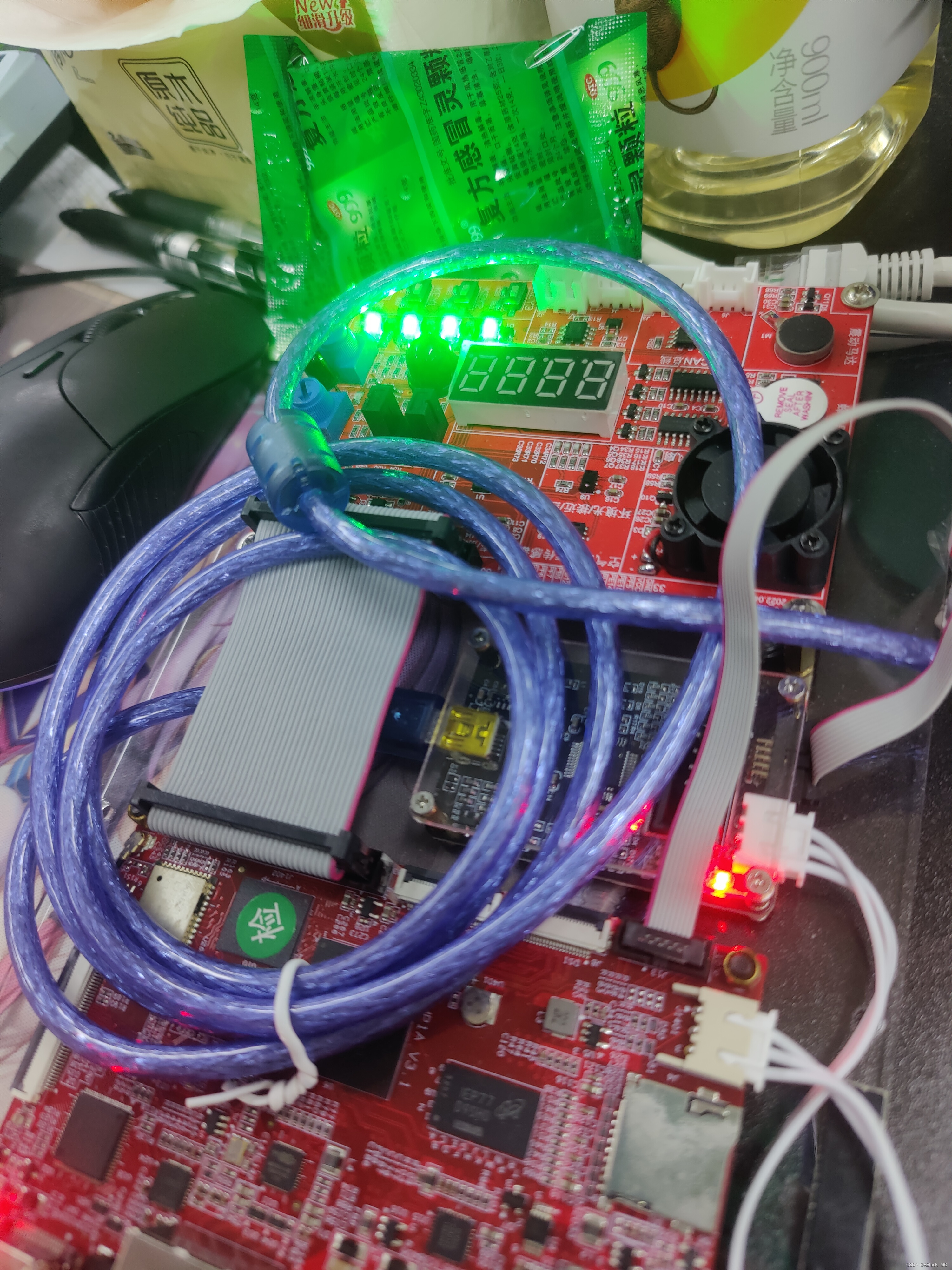pdri.ko
#include <linux/init.h>
#include <linux/module.h>
#include <linux/platform_device.h>
#include <linux/mod_devicetable.h>
#include <linux/of.h>
#include <linux/of_gpio.h>
struct resource *res;
unsigned int irq1;
struct gpio_desc *gpiono1;
struct gpio_desc *gpiono2;
struct gpio_desc *gpiono3;
struct platform_device *pdev1;
struct class *cls;
struct device *dev;
int major;
char kbuf[128] = {0};
//定义操作方法
int mycdev_open(struct inode *inode, struct file *file)
{
printk("%s:%s:%d\n", __FILE__, __func__, __LINE__);
return 0;
}
ssize_t mycdev_read(struct file *file, char *ubuf, size_t size, loff_t *lof)
{
printk("%s:%s:%d\n", __FILE__, __func__, __LINE__);
int ret1=copy_to_user(ubuf,kbuf,size);
if(ret1)
{
printk("copy_to_user filed\n");
return -EIO;
}
return 0;
}
ssize_t mycdev_write(struct file *file, const char *ubuf, size_t size, loff_t *lof)
{
printk("%s:%s:%d\n", __FILE__, __func__, __LINE__);
int ret=copy_from_user(kbuf,ubuf,size);
if(ret)
{
printk("copy_from_user filed\n");
return -EIO;
}
if(!strcmp(kbuf,"on"))
{
gpiod_set_value(gpiono1,1);
gpiod_set_value(gpiono2,1);
gpiod_set_value(gpiono3,1);
}
else if(!strcmp(kbuf,"off"))
{
gpiod_set_value(gpiono1,0);
gpiod_set_value(gpiono2,0);
gpiod_set_value(gpiono3,0);
}
return 0;
}
int mycdev_close(struct inode *inode, struct file *file)
{
printk("%s:%s:%d\n", __FILE__, __func__, __LINE__);
return 0;
}
//定义操作方法结构体变量并赋值
struct file_operations fops = {
.open = mycdev_open,
.read = mycdev_read,
.write = mycdev_write,
.release = mycdev_close,
};
int pdrv_probe(struct platform_device *pdev)
{
// 字符设备驱动注册
pdev1 = pdev;
major = register_chrdev(0, "mychrdev", &fops);
if (major < 0)
{
printk("字符设备驱动注册失败\n");
return major;
}
printk("字符设备驱动注册成功:major=%d\n", major);
// 向上提交目录
cls = class_create(THIS_MODULE, "mychrdev");
if (IS_ERR(cls))
{
printk("向上提交目录失败\n");
return -PTR_ERR(cls);
}
printk("向上提交目录成功\n");
// 向上提交设备节点信息
int i; // 向上提交三次设备节点信息
for (i = 0; i < 3; i++)
{
dev = device_create(cls, NULL, MKDEV(major, i), NULL, "myled%d", i);
if (IS_ERR(dev))
{
printk("向上提交设备节点失败\n");
return -PTR_ERR(dev);
}
}
printk("向上提交设备节点成功\n");
gpiono1 = gpiod_get_from_of_node(pdev1->dev.of_node,"led1-gpio-no",0,GPIOD_OUT_HIGH,NULL);
gpiono2 = gpiod_get_from_of_node(pdev1->dev.of_node,"led2-gpio-no",0,GPIOD_OUT_LOW,NULL);
gpiono3 = gpiod_get_from_of_node(pdev1->dev.of_node,"led3-gpio-no",0,GPIOD_OUT_HIGH,NULL);
if(IS_ERR(gpiono1))
{
printk("解析GPIO on资源1失败\n");
return -PTR_ERR(gpiono1);
}
printk("解析GPIO on资源1成功\n");
if(IS_ERR(gpiono2))
{
printk("解析GPIO on资源2失败\n");
return -PTR_ERR(gpiono2);
}
printk("解析GPIO on资源2成功\n");
if(IS_ERR(gpiono3))
{
printk("解析GPIO on资源3失败\n");
return -PTR_ERR(gpiono3);
}
printk("解析GPIO on资源3成功\n");
printk("USB链接成功\n");
return 0;
}
int pdrv_remove(struct platform_device *pdev)
{
//释放资源
gpiod_set_value(gpiono1,0);
gpiod_put(gpiono1);
gpiod_set_value(gpiono2,0);
gpiod_put(gpiono2);
gpiod_set_value(gpiono3,0);
gpiod_put(gpiono3);
printk("USB设备已弹出\n");
return 0;
}
struct of_device_id oftable[] = {
{.compatible = "kpkp,myplatform",},
{.compatible = "kpkp,myplatform1",},
{},
};
struct platform_driver pdrv = {
.probe = pdrv_probe, //这是个int类型函数名,参数类型为struct platform_device*
.remove = pdrv_remove, //这是个int类型函数名,,参数类型为struct platform_device*
.driver = {
.name = "AK47",
.of_match_table = oftable,
},
};
//一键注册宏
module_platform_driver(pdrv);
MODULE_LICENSE("GPL");pdev.ko
#include <linux/init.h>
#include <linux/module.h>
#include <linux/platform_device.h>
//这是个结构体
struct resource res[] = {
[0]={
.start = 0x50006000,
.end = 0x50006000 + 0x400,
.flags = IORESOURCE_MEM,
},
[1]={
.start = 71,
.end = 71,
.flags = IORESOURCE_IRQ,
},
};
void pdev_release(struct device *dev) //这是个函数名
{
printk("已弹出,期待下次链接\n");
}
struct platform_device pdev = {
.name = "AK47",
.id = PLATFORM_DEVID_AUTO,
.dev.release = pdev_release, //这是个函数名
.num_resources = ARRAY_SIZE(res),
.resource = res, //这是个结构体
};
static int __init mycdev_init(void)
{
//定义设备端对象且初始化
//注册设备信息进内核
if(platform_device_register(&pdev) < 0 )
{
printk("注册设备信息失败\n");
return -ENXIO;
}
return 0;
}
static void __exit mycdev_exit(void)
{
//注销设备信息
platform_device_unregister(&pdev);
}
module_init(mycdev_init);
module_exit(mycdev_exit);
MODULE_LICENSE("GPL");ledu.c
#include <stdlib.h>
#include <stdio.h>
#include <sys/types.h>
#include <sys/stat.h>
#include <sys/ioctl.h>
#include <fcntl.h>
#include <unistd.h>
#include <string.h>
int main(int argc,const char * argv[])
{
int a=0;
char buf[128] = "";
char buf1[128] = "";
int fd1=open("/dev/myled0",O_RDWR);
int fd2=open("/dev/myled1",O_RDWR);
int fd3=open("/dev/myled2",O_RDWR);
if(fd1<0)
{
printf("打开设备文件1失败\n");
exit(-1);
}
if(fd2<0)
{
printf("打开设备文件2失败\n");
exit(-1);
}
if(fd3<0)
{
printf("打开设备文件3失败\n");
exit(-1);
}
memset(buf,0,sizeof(buf));
while(1)
{
printf("请输入灯的控制(1开灯/0关灯) => ");
scanf("%d",&a);
write(fd1,buf,sizeof(buf));
write(fd2,buf,sizeof(buf));
write(fd3,buf,sizeof(buf));
if(a == 1)
{
strcpy(buf,"on");
write(fd1,buf,sizeof(buf));
write(fd2,buf,sizeof(buf));
write(fd3,buf,sizeof(buf));
}
else if(a == 0)
{
strcpy(buf,"off");
write(fd1,buf,sizeof(buf));
write(fd2,buf,sizeof(buf));
write(fd3,buf,sizeof(buf));
}
read(fd1,buf1,sizeof(buf));
printf("buf1:%s\n",buf1);
}
return 0;
























 1万+
1万+

 被折叠的 条评论
为什么被折叠?
被折叠的 条评论
为什么被折叠?








